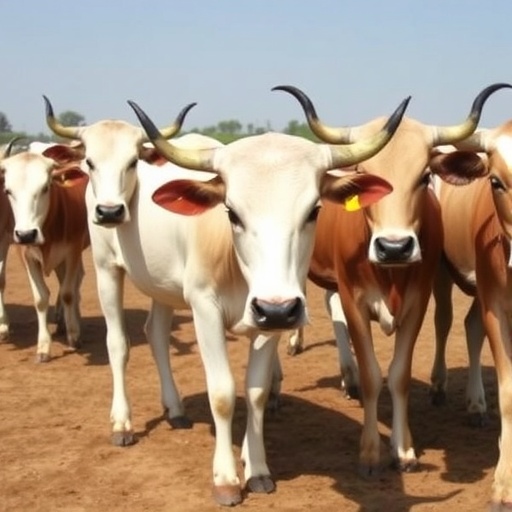In an era where climate change has become a pressing global issue, the livestock sector faces unique challenges, particularly in tropical regions characterized by extreme heat. Recent studies have highlighted the importance of identifying animal breeds that can withstand high temperatures, ensuring sustainable agricultural practices and food security. A groundbreaking research effort led by Aliyu and his team sheds light on the physiological and production capabilities of the White Fulani cow, a breed renowned for its resilience in harsh environments. The comprehensive approach employed in this study employs the Technique for Order of Preference by Similarity to Ideal Solution (TOPSIS), a multi-criteria decision-making tool that provides critical insights into the selection of heat-tolerant livestock.
The White Fulani cow, a breed indigenous to West Africa, is known for its impressive adaptability to tropical conditions. As temperatures continue to rise, understanding the physiological traits that confer heat tolerance becomes paramount. The research team focused on a range of physiological parameters, including body temperature regulation, respiratory rate, and hydration status. These factors were meticulously measured under simulated tropical farm conditions to assess how these animals cope with heat stress, a condition that can adversely affect their health and productivity.
One of the most profound aspects of this study was the application of the TOPSIS methodology. By evaluating various physiological and production-related criteria, the researchers were able to not only identify the most heat-tolerant individuals among the White Fulani cows but also rank them according to their performance. This ranking system is critical, as it provides farmers with data-driven insights to make informed decisions when selecting breeding stock that maximizes productivity while minimizing heat-related stress.
The research findings reveal a significant variation in heat tolerance among individual White Fulani cows. This variation presents an opportunity for breeders and farmers to enhance their herds by selectively breeding animals that demonstrate superior resilience to heat stress. The implications of these findings extend beyond individual farmers; they contribute to the broader scientific understanding of livestock adaptation in changing climates, offering strategies for improving overall herd health and productivity in tropical regions.
The physiological profiling performed in this study not only addressed immediate concerns regarding heat tolerance but also considered long-term sustainability. As temperatures rise, especially in equatorial regions where agriculture heavily relies on livestock, identifying and promoting resilient breeds will be crucial for maintaining food security. The research underscores the need for innovative approaches in agricultural practices to adapt to ongoing climatic changes.
Another critical finding from this research was the interplay between hydration status and heat tolerance. The study showed that well-hydrated animals exhibited significantly better physiological responses to extreme temperatures. The importance of access to clean, adequate water resources becomes evident, marking it as an essential factor in modern livestock management practices aimed at mitigating the effects of heat stress.
Moreover, the mechanisms by which the White Fulani cows maintain thermoregulation were fascinating to investigate. The research uncovered that these cows possess unique adaptations, such as increased sweating rates and altered behavior patterns, which allow them to manage their body temperatures effectively. Understanding these mechanisms provides valuable insight into the evolutionary advantages conferred to the breed and may inform selective breeding programs aimed at enhancing these traits.
The study also acknowledged the significance of environmental factors in influencing the heat tolerance of the White Fulani cows. It highlighted how different management practices, such as housing conditions and feeding strategies, can directly impact the physiological responses of the animals. This insight is vital for livestock producers who aim to optimize their herds’ performance under various environmental stresses.
With the results from this study being pivotal in the context of future research, there is a call for continued investigations into the genetic basis of heat tolerance in livestock. The combination of physiological profiling and advanced ranking systems like TOPSIS can provide a robust framework for such research, leading to the development of more resilient livestock breeds that can withstand the rigors of climate change.
In summation, the research conducted by Aliyu et al. provides a comprehensive look into the physiological and production profiling of White Fulani cows in heat-stressed conditions. The implications of this work are profound, as they not only serve the immediate needs of farmers in tropical regions but also contribute to the global discourse on livestock adaptation in an era of rapid climate change. As the agricultural sector grapples with these challenges, studies like this pave the way for innovative solutions that ensure sustainability, productivity, and food security for generations to come.
As we move forward, it will be essential for stakeholders in the agriculture sector—including farmers, researchers, and policymakers—to prioritize the integration of scientific research findings into practical applications. By leveraging the insights from studies on heat-tolerant breeds like the White Fulani cow, we can create more resilient agricultural systems that are better equipped to face the evolving challenges posed by climate change. The journey towards sustainable livestock farming is long, but with continued research and dedication, it is indeed within our reach.
The relevance of this research extends beyond the immediate findings, inspiring future investigations that could unveil even more adaptive strategies within livestock management. As we face an uncertain climatic future, the importance of adapting our agricultural practices to ensure the survival and prosperity of both livestock and farmers has never been clearer. The world is watching, and the agricultural community must act boldly and decisively in its pursuit of innovative solutions.
Subject of Research: Heat tolerance in White Fulani cows under tropical farm conditions.
Article Title: Physiological and production profiling with TOPSIS multi-criteria ranking for identification of heat-tolerant White Fulani cows under tropical farm conditions.
Article References: Aliyu, M., Sikiru, A.B., Dikko, A.H. et al. Physiological and production profiling with TOPSIS multi-criteria ranking for identification of heat-tolerant White Fulani cows under tropical farm conditions. Discov Anim 2, 88 (2025). https://doi.org/10.1007/s44338-025-00139-x
Image Credits: AI Generated
DOI: https://doi.org/10.1007/s44338-025-00139-x
Keywords: heat tolerance, White Fulani cows, TOPSIS, livestock management, climate adaptation, physiological profiling, sustainability.




